- Home
- J. T. Edson
Calamity Jane 6: The Hide and Horn Saloon (A Calamity Jane Western)
Calamity Jane 6: The Hide and Horn Saloon (A Calamity Jane Western) Read online
The Home of Great Western Fiction!
Everyone in Tennyson wanted their town to look really good … Reconstruction was ending and a new Governor was taking over … respectability and affluence were the order of the day!
Then, to Tennyson’s alarm, they learned the Hide and Horn Saloon had changed hands. There was nothing wrong with the new owner, a hard shooting, hard punching lady called Madame Bulldog who looked as though she could run the whole show with one hand. The trouble came with the family of the previous owner - they wanted the saloon back - anyway they could get it …
And suddenly, at the worst possible time, the folk of Tennyson found they had a war on their hands … and the prize was THE HIDE AND HORN SALOON...
CALAMITY JANE 6: THE HIDE AND HORN SALOON
By J. T. Edson
First published by Corgi Books in 1983
Copyright © 1983, 2019 by J. T. Edson
First Kindle Edition: June 2019
Names, characters and incidents in this book are fictional, and any resemblance to actual events, locales, organizations, or persons living or dead is purely coincidental.
All rights reserved. No part of this book may be reproduced or transmitted in any form or by any means, electronic or mechanical, including photocopying, recording or by any information or storage and retrieval system, without the written permission of the author, except where permitted by law.
This is a Piccadilly Publishing Book
Cover illustration by Tony Masero
Find out more about Tony’s work here and here
Series Editor: Ben Bridges
Text © Piccadilly Publishing
Published by Arrangement with the Author’s Agent.
For my good friend Pam Brett, who always beats me at golf—she keeps the score, you see—and her daughter, Vickie, who finds my lost balls—at fifty pence a time.
Table of Contents
Author’s note
One – A Real Tough Place
Two – It Belongs to Me Now
Three – Call Me “Madam Bulldog”
Four – Maxie Didn’t Hire Them
Five – I’m Counting On You Losing
Six – I Was Just Lucky, I Guess
Seven – I’ve Never Heard of You
Eight – I’ll Blow Your God-damned Head Off
Nine – I’ll Get Back That Saloon
Ten – If I Wasn’t A Lady
Eleven –All Sociable and Friendly
Twelve – “Eleven Dollar Bill”
Thirteen – You Being a Woman Won’t Stop Me
Fourteen – I Want Some Questions Answered
Fifteen – Find Out Who’s the Better Woman
Sixteen – There’ll Be a Riot If It’s Stopped
Seventeen – Fight Fire With Fire
Appendix
About the Author
Author’s note
While complete in itself, this title precedes the events recorded in: Cut One, They All Bleed. Some of the events recorded in both volumes previously appeared under the title, Part One, ‘Better than Calamity’, The Wildcats. However, the Counter family has agreed that the full story can at last be put into print. They made a stipulation that the two books must be included in the Calamity Jane and not the Floating Outfit series, as was the case formerly, which we have done.
To save our ‘old hands’ from repetition, but for the benefit of new readers, we have given information about various references to incidents and explained those Old West terms about which we are mostly regularly asked in the form of an Appendix.
We realize that in our present ‘permissive’ society, we could include the actual profanities used by various people in the narrative, but we do not concede that a spurious desire for ‘realism’ is any excuse to do so.
Lastly, as we do not pander to the current ‘trendy’ usage of the metric system, except where the calibers of certain firearms—i.e., Walther P-38, 9mm—are concerned, we will continue to employ miles, yards, feet, inches, pounds and ounces, when referring to distances and weights.
J.T. EDSON
One – A Real Tough Place
The arrival of a stagecoach was considered to be something of an event in any small or medium sized town west of the Mississippi River that was fortunate enough to be the recipient of such a service.
Certainly Tennyson, in Sand County, Texas, was no exception!
With the twice weekly stagecoach being due, much the same crowd as usual was gathered in the immediate vicinity of the Wells Fargo office and depot just after one o’clock that warm early spring afternoon. Prominent was a proportion of local businessmen, ostensibly present to find out whether small items they had ordered were aboard. A number of genuine loafers, inevitably, were on hand, some of whom belonged to that section of the community which existed either with no visible means of support, or by taking occasional forms of casual employment. Others were cowhands from the surrounding ranches, paying a visit during what a later generation would call a “day off”. Having nothing of greater importance demanding their attention, all were hoping the passengers on the stagecoach would be interesting and offer a subject for conversation.
Several of Tennyson’s “good” women invariably attended each arrival, anxious to preserve their upright and God-fearing community and conscious of the town’s growing prosperity and further expansion. Like their menfolk, sober citizens all, they regarded the present status of their township with mixed feelings. They considered that having been accepted as a recognized stop on a major stage route was proof of the social prominence acquired by Tennyson. Nevertheless, this also emphasized a sense of injustice over the town of Garnett which was no larger than Tennyson but which—as result of legal shenanigans on the part of certain carpetbagger politicians with business connections there—had been appointed seat of Sand County. However, “Reconstruction” was in the process of being brought to an end. The hated rule of Governor Bartholemew Davis would soon be over and it was hoped the elected dignitary who replaced him might be persuaded to redress the situation. Therefore, with such a desirable end in mind, members of the Ladies Guild for Civic Betterment felt it incumbent upon themselves to ensure no undesirable persons should arrive with the intention of taking up even temporary residence in their community.
However, in one respect, the presence and scrutiny of the “good” women was a needless precaution!
Equally aware of the need to present a suitably law abiding image, although the term was not yet in popular usage and expressing it in such a fashion would never have occurred to him, Town Marshal Tune Collier always took measures which were intended to prevent any unsavory characters invading his bailiwick. [1] But on this occasion, as other matters were demanding his attention, his deputy was standing in the background at a point which offered an unrestricted view of the arrival area.
Medium height, stocky, white haired, walrus mustached and leathery featured, with grin quirks at the corners of eyes little dimmed by the passage of time, Deputy Town Marshal Herman ‘Pockets’ Hoscroft could have passed for one of the genuine loafers if it had not been for two things. One was the well-polished badge of office on his black and white calfskin vest, the other, the Greener ten gauge shotgun resting its twenty inch long twin barrels with apparent negligence across the crook of his bent left arm—the latter augmenting the walnut handled Colt 1860 Army Model revolver in the open topped holster of his Confederate States’ cavalry style gunbelt. Apart from these indications of his true status, his attire was that of a not too prosperous Texas’ cowhand. Appearances notwithstanding, and regardless o
f having long since passed the first flush of youth, he was fully capable of enforcing a suggestion that an incoming passenger might be happier elsewhere and he had no need to call upon the assistance of the “good” women, nor his superior in most cases, to support him.
A surge of anticipation, far greater than would have manifested itself in regions of greater sophistication, swept through the assembled spectators as the stagecoach came into view over the not too distant horizon. It was no mere “mud wagon” making a connection to a main stage route, but a full blown Concord with a six- horse team and offering all the style of its superlative class of transport. [2] Not only did it bring in the United States’ mail, but a certain amount of freight could also be carried; including, on occasion, items of considerable value in the strongbox carried beneath the driver’s seat. Nevertheless, it was the passengers who aroused the interest of the waiting people rather than the load. In addition to the possibility of there being travelers of some consequence aboard, even the humblest passengers bore news of events elsewhere which would not otherwise have reached the town until much later by conventional means.
To be strictly truthful, up to that time no person of any consequence had ever visited, nor even passed through, Tennyson. The famous names of the theatrical and entertainment world never came to display their respective talents. Nor, particularly with the population disfranchised as a result of Texas having supported the right of any State to secede from the Union (if finding its interests incompatible with those of the Federal Government) had any prominent politician as yet considered it might prove worth his while to arrive and explain his policies in the hope of acquiring the votes of the citizens. Neither had any of the gun fighters whose names had become legendary, nor members of the ranching business, put in an appearance by stagecoach, or any other kind of transportation. Furthermore, as the town had never attained a reputation for offering games of chance with high stakes—often a most lucrative source of added income even to businesses not directly involved—noted professional gamblers never felt inclined to include it in their itineraries.
Regardless of all this, goaded by “the hope which springs eternal within the human breast”, the various onlookers invariably forgathered in case the situation might change for the better.
To all appearances, on its arrival, the latest stagecoach seemed unlikely to offer any significant alteration to the pattern!
The only passenger was a woman!
However, although the solitary passenger alighted and was clearly waiting for her baggage to be unloaded, almost everybody present realized she was a stranger to Tennyson! Five foot five in height, the woman looked to be in her late thirties or early forties. A small and dainty Wavelean hat sat impaled by a pin to piled up blonde hair which the “good” ladies, although the conclusion perhaps resulted from feminine cattiness towards one much better favored physically than themselves, whispered to one another had acquired its hue by artificial means. While not exactly out and out beautiful in the classic sense, her features were attractive, with full lips which were clearly used to merriment and yet also gave a hint of a very strong personality. They, and her cheeks, had just enough make-up to be acceptable by the social standards of the town, even to the most discerning observers of her own sex. Stylish and costly, her dove grey two-piece traveling costume and frilly bosomed light blue silk blouse were in just as excellent taste. The black gloves she was wearing prevented her marital status from being exhibited, but the small amount of jewelry she was displaying was clearly of good quality and not ostentatious. Her clothes tended to emphasize, though not blatantly or with vulgarity, a build which was less than slender. However, its plumpness was firm and offered no suggestion of being comprised of over-indulgent fat. It was comprised of a large bosom, a reasonably trim waist and fully curvaceous hips of a kind held by the male population of the period to be the ideal female figure.
Watching the hostlers who were present starting to unload a fair amount of expensive baggage, implying the newcomer was intending to make an extended stay in the town, considerable speculation was aroused amongst the spectators. A variety of suggestions, some created more on wishful thinking rather than logic, and others based upon over imaginative, even romantic, reasoning were being produced—if not mentioned openly—to account for her arrival and apparent intention to remain in Tennyson.
One school of thought, predominantly masculine, wondered if the blonde might perhaps be a rich widow from the East who had come to Texas in search of a more virile replacement husband than was available back home.
In a similar vein, drawing conclusions from her calm poise, assurance and excellent taste in clothing, some of the crowd concluded she could be a famous theatrical lady touring the Lone Star State to forget a love affair which had gone wrong. However, this did not explain why she was planning to stay in Tennyson. Despite its growth, the town boasted only one saloon of any size and, even when the owner was present, this rarely imported entertainers. It seemed highly unlikely that Maxwell Higgins would change his policy whilst absent on vacation.
By far the most imaginative line of reasoning decided the newcomer might have ‘gone to Texas’, to use a popular saying of the day, while on the run from the law after having been involved in some spectacular major crime—of passion, in all probability—wherever she had come from.
It must be confessed that the subscribers to this particular theory were in a minority!
Nor, although he was eyeing her with as much interest as the other spectators, was the elderly deputy marshal one of the few contemplating such a fanciful notion. He did, nevertheless, conclude his superior would be interested to hear of her arrival and any other information which might be forthcoming. She was, asserted his instincts acquired by many years of serving as a peace officer, no ordinary visitor or potential permanent resident.
If the blonde was aware of the speculation generated by her descent from the stagecoach, or noticed the scrutiny to which she was being subjected on all sides, she gave not the slightest indication of it. Instead, she accepted the bulky brown pigskin valise which the shotgun messenger had collected from inside the vehicle, and went to where the driver was talking with the agent for the Wells Fargo company.
‘Good afternoon,’ the woman greeted, as the driver took and started to sign the delivery receipt book with which he had been presented. Her voice had the friendly assurance of one long accustomed to associating with men on closer to equal terms than was usual in that day and age, but—except it did not suggest her origins were south of the Mason-Dixon line—her accent was indefinable as to a specific region. ‘Can you fix it to have what I don’t take along of my gear fetched down to the Hide and Horn for me, please?’
‘Cert…!’ the agent commenced automatically, being long accustomed to receiving such a request from incoming passengers. Then, as he heard the various excited comments which were rising from the crowd, a full appreciation of what had been asked of him struck home and he squawked rather than merely inquired, ‘The Hide and Horn?’
‘The Hide and Horn,’ the blonde confirmed, placing a similar emphasis upon the name of the destination she had given, and still not taking the slightest notice of the response elicited by her words amongst the people standing around. ‘You do know where it is, don’t you?’
‘Of course I know where it is, ma’am!’ the agent declared, swinging his gaze involuntarily along Vernon Street in the direction of the establishment under discussion; although it could not be seen from where they were standing. ‘B-But it’s a saloon!’
‘Well, yes,’ the newcomer answered, with a suggestion of dry humor which nonetheless avoided out and out sarcasm. ‘That’s what good old Maxie Higgins told me it was when he figured his king high flush had my eights and sevens full house licked. [3] So, seeing as how it didn’t, I hope it’s as good a saloon as he claimed it to be.’
There was a calm confidence about the blonde as she was delivering the pronouncement, which implied she ‘knew her way arou
nd’. It also suggested she was fully aware that the information she was imparting would be of considerable interest to more than just the man she was addressing, but that she was not unduly concerned over the type of public opinion which was starting to be expressed by one section of the crowd.
As was only to be expected, what the newcomer had said was meeting with a mixed reception!
However, only the majority of the men present were expressing various stages of approval. While the younger members of the Ladies Guild for Civic Betterment might consider her purpose in coming to Tennyson suggested a defiance of convention to be commended, they were too wise to publicly voice such a point of view. The remainder, a group of dried-up, vinegar-faced wives, spinsters and maiden aunts who were the power in the association, started shaking their heads, clucking their tongues and audibly mumbling their disapprobation.
‘Disgusting!’
‘Shocking!’
‘This is a disgrace!’
‘What will the new Governor say?’
‘Marshal Collier must be told of this!’
Despite hearing various adverse comments, as it was intended she should, the blonde did not attempt to reply verbally. Instead, she turned and ran a glance around her critics. Something in her demeanor brought the cackle of remarks to a halt. Despite their usual assumption of superiority over everybody not fortunate enough to belong to their select circle, not one of the objectors was willing to match her gaze and all found something else to which to give their attention.
‘Hey there, cowboy.’ the newcomer exclaimed, concluding she could leave a confrontation with the “good” women of the community until later, and turning her eyes to the nearest of the masculine spectators. Gesturing with the pigskin valise grasped in her left hand, she went on, ‘Happen you tote this along to the Hide and Horn Saloon for me, should you be able to get that far without needing to fork a horse, there’ll be free drinks at the bar for you tonight.’

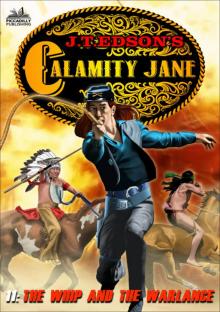 Calamity Jane 11
Calamity Jane 11 The Floating Outift 33
The Floating Outift 33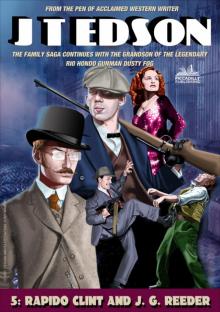 Cap Fog 5
Cap Fog 5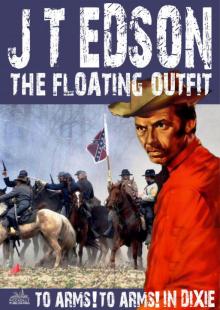 The Floating Outfit 34
The Floating Outfit 34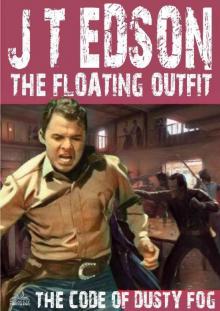 The Code of Dusty Fog
The Code of Dusty Fog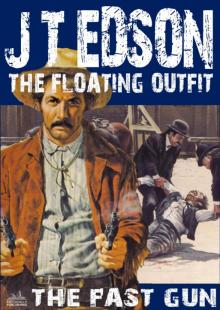 The Floating Outfit 21
The Floating Outfit 21 The Floating Outift 36
The Floating Outift 36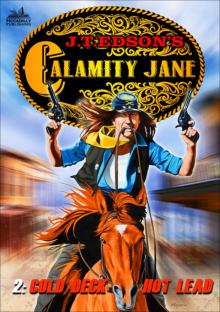 Calamity Jane 2
Calamity Jane 2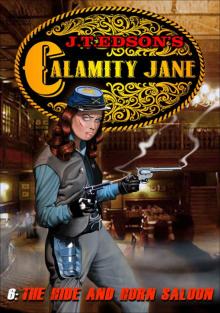 Calamity Jane 6: The Hide and Horn Saloon (A Calamity Jane Western)
Calamity Jane 6: The Hide and Horn Saloon (A Calamity Jane Western) Waco 7
Waco 7 The Floating Outfit 25
The Floating Outfit 25 Waco 7: Hound Dog Man (A Waco Western)
Waco 7: Hound Dog Man (A Waco Western) The Floating Outfit 47
The Floating Outfit 47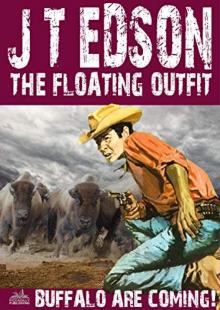 The Floating Outfit 42: Buffalo Are Coming!
The Floating Outfit 42: Buffalo Are Coming! The Floating Outfit 46
The Floating Outfit 46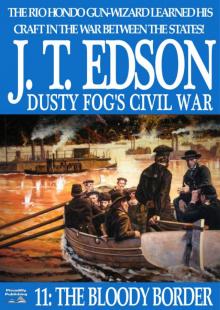 Dusty Fog's Civil War 11
Dusty Fog's Civil War 11 The Floating Outfit 61
The Floating Outfit 61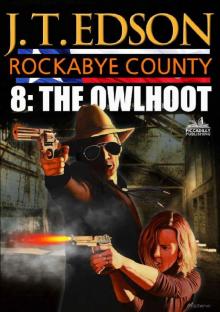 The Owlhoot
The Owlhoot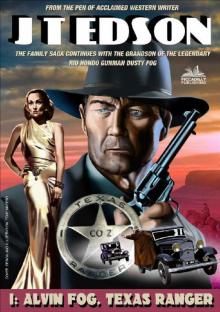 Alvin Fog, Texas Ranger
Alvin Fog, Texas Ranger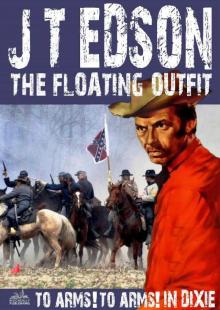 The Floating Outfit 34: To Arms! To Arms! In Dixie! (A Floating Outfit Western)
The Floating Outfit 34: To Arms! To Arms! In Dixie! (A Floating Outfit Western) The Floating Outfit 44
The Floating Outfit 44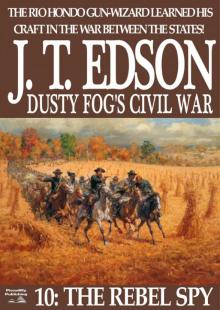 Dusty Fog's Civil War 10
Dusty Fog's Civil War 10 Calamity Jane 10
Calamity Jane 10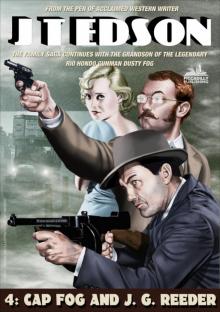 Cap Fog 4
Cap Fog 4 The Floating Outfit 51
The Floating Outfit 51 The Floating Outfit 50
The Floating Outfit 50 The Floating Outfit 49
The Floating Outfit 49 The Floating Outfit 10
The Floating Outfit 10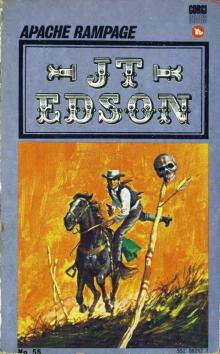 Apache Rampage
Apache Rampage The Floating Outfit 15
The Floating Outfit 15 Ranch War
Ranch War The Floating Outfit 11
The Floating Outfit 11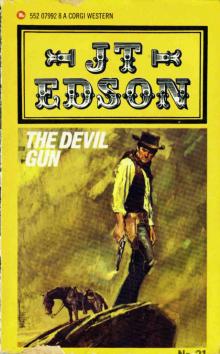 The Devil Gun
The Devil Gun Sacrifice for the Quagga God (A Bunduki Jungle Adventure Book 3)
Sacrifice for the Quagga God (A Bunduki Jungle Adventure Book 3) Comanche (A J.T. Edson Western Book 1)
Comanche (A J.T. Edson Western Book 1) The Floating Outfit 48
The Floating Outfit 48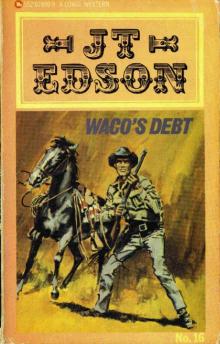 Wacos Debt
Wacos Debt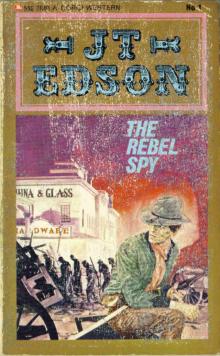 The Rebel Spy
The Rebel Spy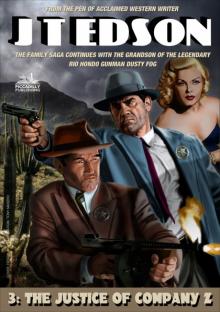 Cap Fog 3
Cap Fog 3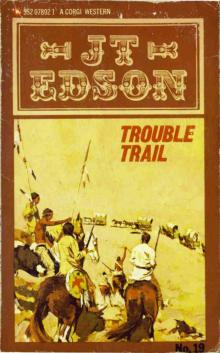 Trouble Trail
Trouble Trail Cold Deck, Hot Lead
Cold Deck, Hot Lead Rockabye County 4
Rockabye County 4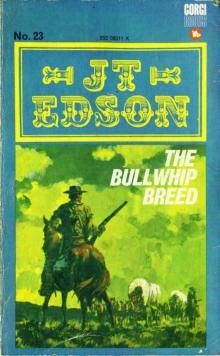 The Bullwhip Breed
The Bullwhip Breed Set Texas Back On Her Feet (A Floating Outfit Western Book 6)
Set Texas Back On Her Feet (A Floating Outfit Western Book 6) The Floating Outfit 25: The Trouble Busters (A Floating Outfit Western)
The Floating Outfit 25: The Trouble Busters (A Floating Outfit Western) Fearless Master of the Jungle (A Bunduki Jungle Adventure
Fearless Master of the Jungle (A Bunduki Jungle Adventure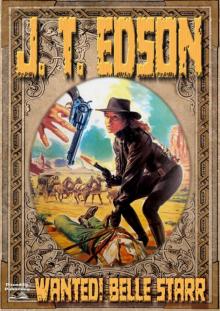 Wanted! Belle Starr!
Wanted! Belle Starr! The Big Hunt
The Big Hunt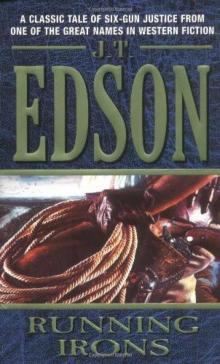 Running Irons
Running Irons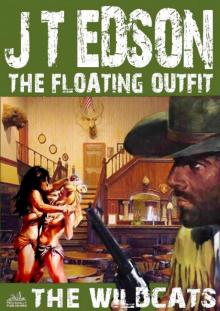 The Floating Outfit 19
The Floating Outfit 19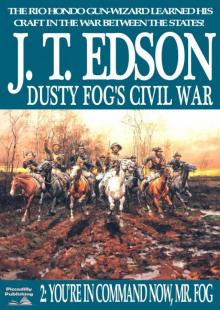 You're in Command Now, Mr Fog
You're in Command Now, Mr Fog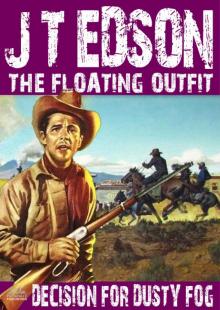 The Floating Outfit 27
The Floating Outfit 27 Texas Killers
Texas Killers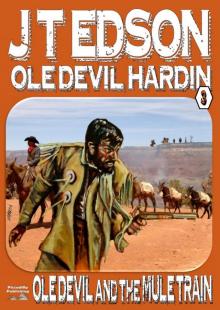 Ole Devil and the Mule Train (An Ole Devil Western Book 3)
Ole Devil and the Mule Train (An Ole Devil Western Book 3) Bunduki and Dawn (A Bunduki Jungle Adventure Book 2)
Bunduki and Dawn (A Bunduki Jungle Adventure Book 2)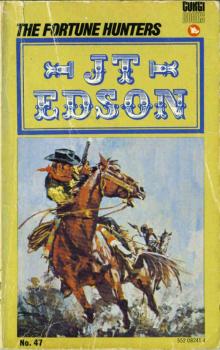 The Fortune Hunters
The Fortune Hunters The Floating Outfit 12
The Floating Outfit 12 The Hide and Tallow Men (A Floating Outfit Western. Book 7)
The Hide and Tallow Men (A Floating Outfit Western. Book 7) Young Ole Devil
Young Ole Devil Slip Gun
Slip Gun The Drifter
The Drifter The Floating Outfit 45
The Floating Outfit 45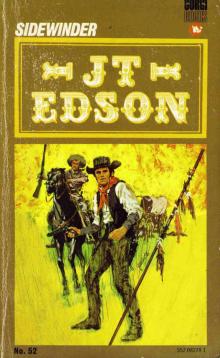 Sidewinder
Sidewinder The Ysabel Kid
The Ysabel Kid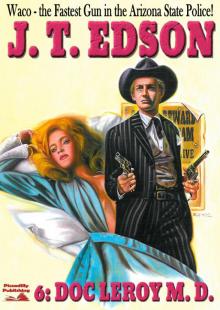 Waco 6
Waco 6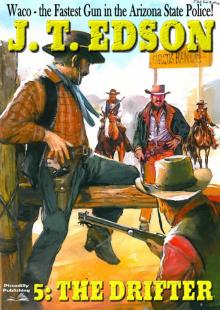 Waco 5
Waco 5 Point of Contact
Point of Contact Under the Stars and Bars (A Dusty Fog Civil War Western Book 4)
Under the Stars and Bars (A Dusty Fog Civil War Western Book 4)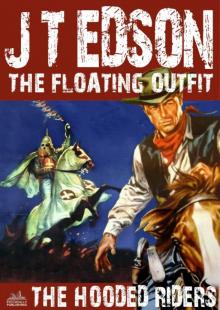 The Floating Outfit 9
The Floating Outfit 9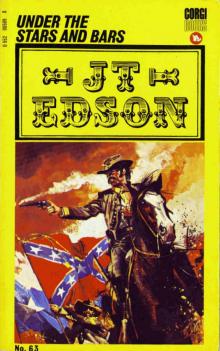 Under the Stars and Bars
Under the Stars and Bars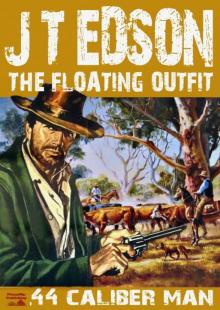 .44 Caliber Man
.44 Caliber Man The Floating Outfit 17
The Floating Outfit 17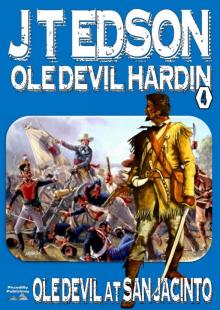 Ole Devil at San Jacinto (Old Devil Hardin Western Book 4)
Ole Devil at San Jacinto (Old Devil Hardin Western Book 4)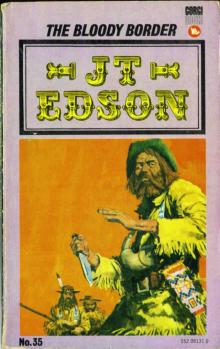 The Bloody Border
The Bloody Border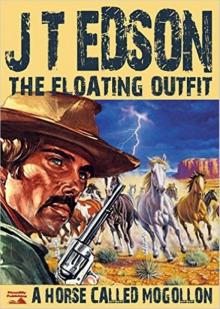 A Horse Called Mogollon (Floating Outfit Book 3)
A Horse Called Mogollon (Floating Outfit Book 3)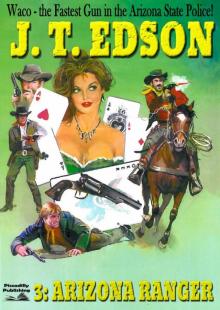 Waco 3
Waco 3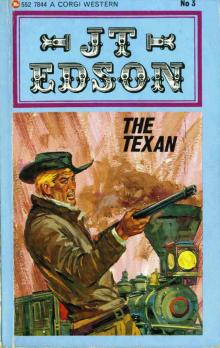 The Texan
The Texan The Floating Outfit 35
The Floating Outfit 35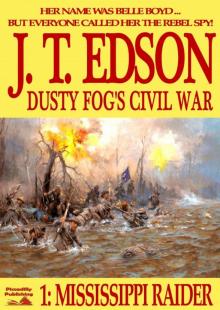 Mississippi Raider
Mississippi Raider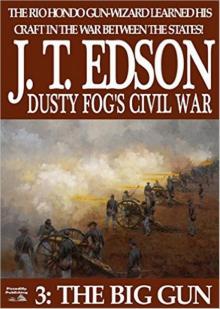 The Big Gun (Dusty Fog's Civil War Book 3)
The Big Gun (Dusty Fog's Civil War Book 3)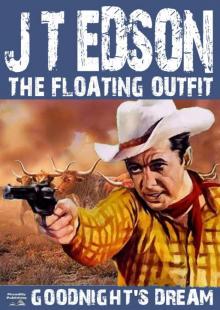 Goodnight's Dream (A Floating Outfit Western Book 4)
Goodnight's Dream (A Floating Outfit Western Book 4) Waco 4
Waco 4 From Hide and Horn (A Floating Outfit Book Number 5)
From Hide and Horn (A Floating Outfit Book Number 5) The Floating Outfit 18
The Floating Outfit 18 Slaughter's Way (A J.T. Edson Western)
Slaughter's Way (A J.T. Edson Western)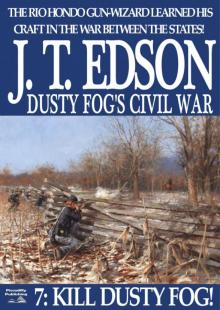 Dusty Fog's Civil War 7
Dusty Fog's Civil War 7 Two Miles to the Border (A J.T. Edson Western)
Two Miles to the Border (A J.T. Edson Western)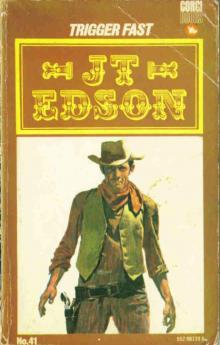 Trigger Fast
Trigger Fast Waco's Badge
Waco's Badge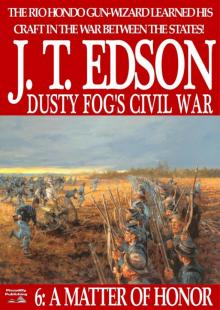 A Matter of Honor (Dusty Fog Civil War Book 6)
A Matter of Honor (Dusty Fog Civil War Book 6)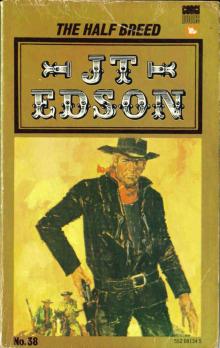 The Half Breed
The Half Breed Bunduki (Bunduki Series Book One)
Bunduki (Bunduki Series Book One)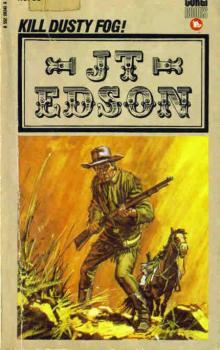 Kill Dusty Fog
Kill Dusty Fog Get Urrea! (An Ole Devil Hardin Western Book 5)
Get Urrea! (An Ole Devil Hardin Western Book 5)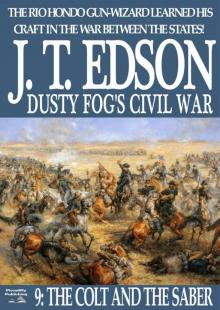 Dusty Fog's Civil War 9
Dusty Fog's Civil War 9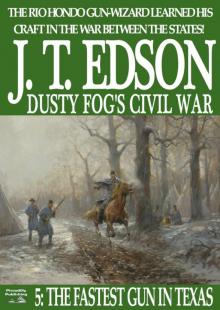 The Fastest Gun in Texas (A Dusty Fog Civil War Book 5)
The Fastest Gun in Texas (A Dusty Fog Civil War Book 5)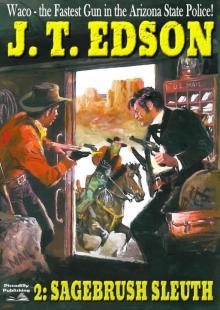 Sagebrush Sleuth (A Waco Western #2)
Sagebrush Sleuth (A Waco Western #2)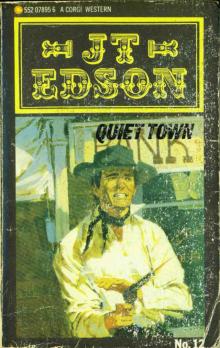 Quiet Town
Quiet Town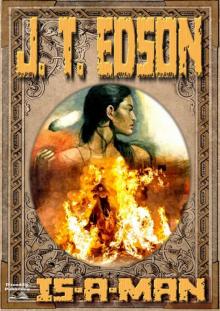 Is-A-Man (A J.T. Edson Standalone Western)
Is-A-Man (A J.T. Edson Standalone Western) Rockabye County 5
Rockabye County 5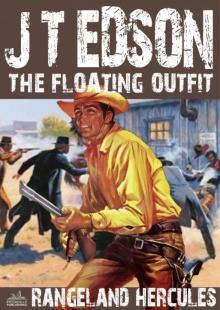 The Floating Outfit 14
The Floating Outfit 14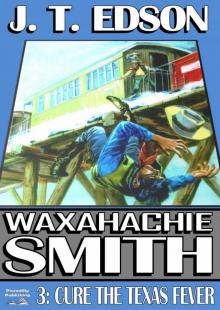 Cure the Texas Fever (A Waxahachie Smith Western--Book 3)
Cure the Texas Fever (A Waxahachie Smith Western--Book 3) The Floating Outfit 13
The Floating Outfit 13 The Road to Ratchet Creek
The Road to Ratchet Creek